Refugee Inclusion: How Businesses Lead Change
In a recent high-profile conference organized by the S&O Institute and the HEC UK House in London on January 23, 2024, academics and businesses shed light on the complex reality of forced migration and the imperative for businesses to play a positive role in this global challenge. The key discussion emphasized the potential mutual benefits for businesses and communities in actively welcoming and supporting refugees. The vibrant testimonials from Ben & Jerry's and The Adecco Group gave hope on how bold and brave businesses can engage in social impact.
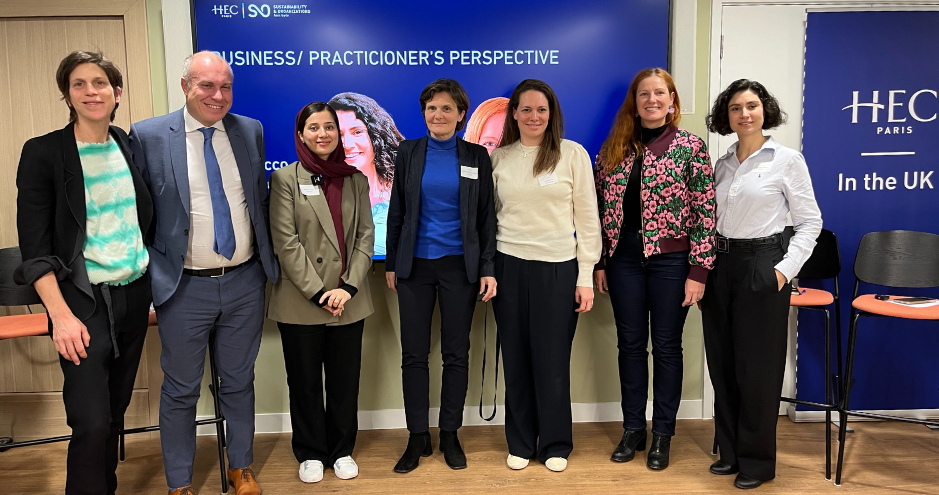
By the end of 2022, 108.4 million people were forcibly displaced worldwide as a result of persecution, conflict, violence, human rights violations, and climate shocks, often a combination thereof (Global Trends report 2022 - UNHCR).
"The figures of 2022 indicate that 32 million people were displaced as a result of extreme events related to climate change, what we call climate disasters," said François Gemenne.
As part of the "Climate and Migration: What is the Role of Businesses?" Conference organized by the Sustainability & Organizations Institute of HEC Paris at the HEC UK House in London, François Gemenne, Scientific Director of the Sustainability and Social Innovation, and Marieke Huysentruyt, Professor of Strategy at HEC Paris, and Academic Director of the Impact Company Lab, advocated the responsibility of businesses on addressing this crucial challenge.
The Urgency to Act Towards Refugees is Now
François Gemenne exposed three myths regarding climate change and refugees. Firstly, there is a misconception that we see the migration caused by climate change as a future risk, while already millions of people have been displaced as a result of climate change impact. Highlighting the reality we are addressing and the necessity for policy solutions to deal with this issue.
Secondly, the notion that climate-induced migration is a new type of migration, while most migrations are multicausal and the two different streams (migration brought on by conflicts and economic reasons) are mixed. These two causes for migration are connected and are impacting each other.
And lastly, the third myth, which sees migration as a threat to society.
Moving on to the Role that Businesses Can Play
Moving on to the role that businesses can play, Marieke Huysentruyt highlighted that one reason businesses must embrace migration is the growing scarcity of labor (not only in advanced economies but also in countries that used to be associated with cheap labor availability, such as Malaysia, South Africa and Thailand).
A large and robust body of evidence shows that the labor force integration of migrants leads to large gains for the migrants and a positive overall gain for the destination country. And yet, there is stark political opposition to immigration across ever more countries. Together, this suggests that businesses will need to be bold:
-
Try to deeply engage with the perspectives of refugees on the labor market ecosystem as well as those welcoming employees on refugee workers;
-
Expand focus on the short-term (placement only) to taking an interest in the trajectory of refugees, long-term inclusion;
-
Expand focus from work alone to ensuring there is child care support, health care, housing, mentoring for refugees;
-
Shift from a centralized approach to empowering local ecosystems.
Marieke also reminded us of the fact that there is close to 1 million Rohingya refugees live in the world's largest Rohingya Camp (and have been there since 2017), 75% of all new internally displaced people are hosted in Africa, and many refugees aspire an entrepreneurial career. How does business respond to these realities? Marieke further expanded our perspective on what businesses can do, by reflecting on how businesses interact with local communities, their value chain workers up and downstream, and reach (or not) migrants as end-users.
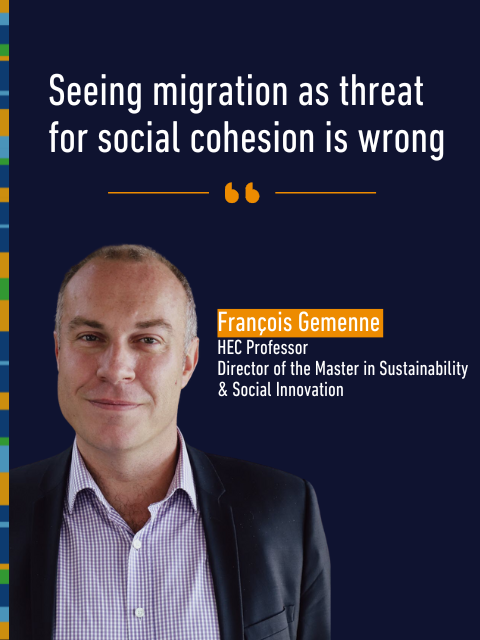
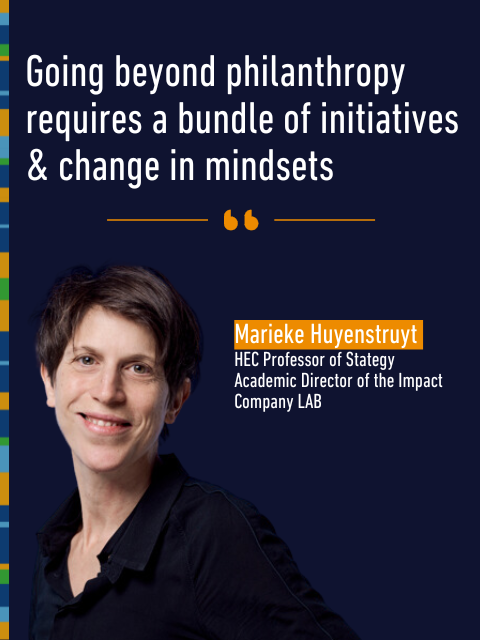
Behishta Nazir, an HEC Imagine Fellow from Afghanistan, gave her testimony before we heard the business practitioners' perspectives. Students from war-torn countries can study at HEC Paris through the Imagine Fellowship program. Behishta talked about her experience as a refugee in Europe after being forced to leave her country due to the fall of the government.
She also emphasized the biases against being a refugee, the underestimation of refugees' abilities, expertise, and experience, and the absence of support and guidance for refugees looking to enter the workforce as employees or entrepreneurs.
Representatives from Ben & Jerry's and Adecco Group, Jessie Macneil-Brown and Raphaelle Thirion, discussed their experiences in promoting refugee rights and helping them integrate into the workforce.“Our focus is on refugee justice because it is a key critical issue impacting Europe, and there hasn’t been enough done, and more importantly, because we can have an impact,” said Jessie Macneil-Brown, Head of Social Mission for Europe at Ben & Jerry's.
Jessie additionally addressed Ben & Jerry's refugee entrepreneurship program, advocacy initiatives, and campaigns that the company undertakes to support the right of refugees to work, open jobs for them, and help them integrate into the workforce. As the first private employer in France, The Adecco Group is driven to address the refugee situation."We must do something, and we can do something.", said Raphaelle Thirion.
We must do something, and we can do something
Raphaëlle explained how The Adecco Group works with its clients and partners to integrate refugees into the companies by offering intensive French language training, vocational training, and a specific onboarding process to help its clients hire and integrate refugee employees. Raphaëlle highlighted the figures, stating that today, Adecco France provides over 3000 jobs for people with refugee status, and over 4,600 jobs in France through all its Business Units. Globally, The Adecco Group has provided jobs and support to 16,000 people under refugee status.
Challenges for The Adecco Group and Ben & Jerry's include biased narratives about migrants and hiring refugees. Focusing on changing the narrative, Jessie and Raphaelle emphasized the advantages that hiring refugees offers to The Adecco Group and Ben & Jerry's companies, as well as their clientele. “I don’t know a newcomer who doesn't want to integrate. They will be so loyal if given the opportunity. They are so passionate and hardworking, trying to give you that sense of belonging. And to give you an example of the advantages, I don’t know any other ice cream company that had a room full of people talking about turmeric, cardamom in their ice creams. All these amazing flavors because we have such diversity in the room and this rich experience of a diverse background,” said Jessie. Highlighting the human value, Raphaëlle indicates that between 70 to 85 percent of refugees as part of the Adecco specific programs get hired in the companies for the long-term as it brings lots of value to the companies (Adecco Clients).
I don’t know a newcomer who doesn't want to integrate. They will be so loyal if given the opportunity. They are so passionate and hardworking, trying to give you that sense of belonging.
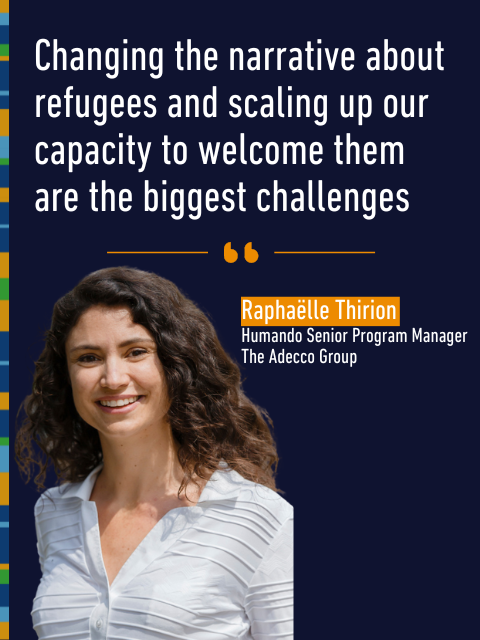
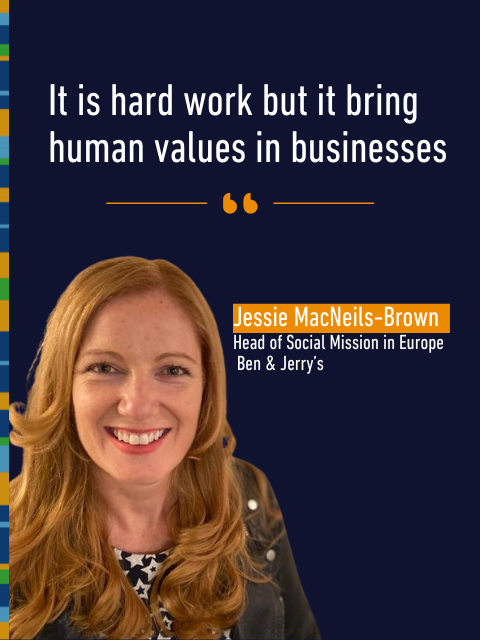
At the end, Professor Benedicte Faivre-Tavignot, Co-Founder of the S&O Institute and Executive Director of the Inclusive Economy Center, gave closing remarks and insights to the conference regarding how HEC Paris and its partners can leverage their resources to promote an inclusive and sustainable economy, echoing what Jessie said during the conversation: “Businesses have a huge responsibility; we welcome those who want to join us, as we don’t want to feel so alone.”
| Committed to thinking, teaching, and acting for an inclusive and sustainable world, the S&O Institute also offers an intensive 6-week certificate program on Inclusive and Social Business. |